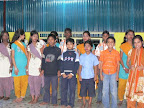The smiles on the kid’s faces, the thirst and desire that they have to learn is not what dragged me back to
The more I thought about it, the more it got to me. How can we make education sustainable? You cannot give kids loans, nor can you exploit them to do work to pay for their education. It really began to annoy me – Why isn’t the government doing more? Should corporations be more responsible, if so how do we make them? Why don’t the rich Bangladeshis care? I even read a book on how the
Instead of getting caught up in who was responsible, I began thinking about how and why I got a free education in
Now I don’t need to waste more blog space saying what I think about the Bangladesh Government, but it was clear who I think is the major contributor to 56 million kids under the age of 15 not receiving a reasonable education here. But again, I have to look past who is to blame and try and work out how education can become sustainable in this unfortunate environment. Even if the government would be capable of organizing schooling for that many children, who would pay for 2/5ths of their population to be schooled? The other 3/5ths are definitely not earning enough to support schooling 56 million through taxes.
That’s where it hit me – and I finally worked out how The Dhaka Project is sustainable.
We are all part of a wider global community, just because boundaries and governments divide us into groups, we are still part of a global community. Donating to a cause like The Dhaka Project is just like paying an optional global tax; it is a payment to make a better and more prosperous global community.
In my view there is no need to focus on making this project sustainable today, nor is there any problem that it is run purely on charitable donations. Education should be a right, just because developing countries’ governments are corrupt and unable to give these kids an education doesn’t mean that we in the developed countries should give up on these kids.
Whilst we will not see distinct and obvious sustainable benefits straight away – they will happen. We have to be comfortable knowing that we are investing in tomorrows change.






No comments:
Post a Comment